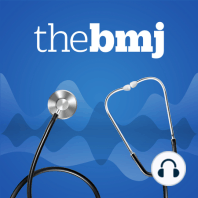21 min listen
Talk evidence covid-19 update - answering questions with big data
FromThe BMJ Podcast
ratings:
Length:
38 minutes
Released:
May 17, 2020
Format:
Podcast episode
Description
Big data is being crunched to help us tackle some of the enormous amount of uncertainty about covid-19, what the symptoms are, fatality rate, treatment options, things we shouldn't be doing.
In these podcasts, we're going to try to get away from the headlines and talk about what we need to know - to hopefully give you some insight into these issues.
This week.
(3.10) Calum Semple, professor of outbreak medicine at the University of Liverpool talks about the ISARIC project - predesigned research brought off the shelf and deployed during a pandemic.
(14.20) Ben Goldacre, doctor, researcher and director of the EBM datalab at the University of Oxford, joins us to talk about how his team have managed to pull together records from 40% of NHS patients to look for patterns in covid-19 morbidity and mortality.
Reading list
OpenSAFELY: factors associated with COVID-19-related hospital death in the linked electronic health records of 17 million adult NHS patients.
https://www.medrxiv.org/content/10.1101/2020.05.06.20092999v1
Features of 16,749 hospitalised UK patients with COVID-19 using the ISARIC WHO Clinical Characterisation Protocol
https://www.medrxiv.org/content/10.1101/2020.04.23.20076042v1
In these podcasts, we're going to try to get away from the headlines and talk about what we need to know - to hopefully give you some insight into these issues.
This week.
(3.10) Calum Semple, professor of outbreak medicine at the University of Liverpool talks about the ISARIC project - predesigned research brought off the shelf and deployed during a pandemic.
(14.20) Ben Goldacre, doctor, researcher and director of the EBM datalab at the University of Oxford, joins us to talk about how his team have managed to pull together records from 40% of NHS patients to look for patterns in covid-19 morbidity and mortality.
Reading list
OpenSAFELY: factors associated with COVID-19-related hospital death in the linked electronic health records of 17 million adult NHS patients.
https://www.medrxiv.org/content/10.1101/2020.05.06.20092999v1
Features of 16,749 hospitalised UK patients with COVID-19 using the ISARIC WHO Clinical Characterisation Protocol
https://www.medrxiv.org/content/10.1101/2020.04.23.20076042v1
Released:
May 17, 2020
Format:
Podcast episode
Titles in the series (100)
Dying at home: This week, we look at how to help patients have better deaths at home.BMJ assistant editor Sophie Cook talks to Emily Collis, a consultant in palliative medicine and the author of a recent clinical review about caring for dying patients in the commun... by The BMJ Podcast
